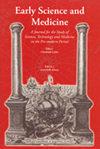Albert the Great on Climatic Determinism
IF 0.2
2区 哲学
Q3 HISTORY & PHILOSOPHY OF SCIENCE
引用次数: 0
Abstract
The concept of ‘climate’ has evolved from its original meaning as an astronomical and geographical reality to a contemporary vision in which it appears as an entity that can be changed and affected by human beings. Long before arriving at the current state of affairs, the thirteenth-century notion of阿尔伯特大帝的气候决定论
“气候”的概念已经从最初的天文和地理现实演变为当代的愿景,它似乎是一个可以被人类改变和影响的实体。早在事态发展到目前的状态之前,13世纪的气候概念就与天堂和超地球领域对经历了世代和腐败的地球身体的影响密切相关。正是在这种特殊意义上,我们可以谈论气候决定论:涉及从上面决定的气候或区域条件对自然生物的形成性和非偶然作用。本文探讨了阿尔伯特大帝对气候决定论的描述,将气候的天文概念与属于自然哲学的两个概念:地点和地点联系起来。为此,我们将依靠阿尔伯特在《自然地点论》(De natura loci)和其他自然哲学著作中提出的自然场所理论。
本文章由计算机程序翻译,如有差异,请以英文原文为准。
求助全文
约1分钟内获得全文
求助全文
来源期刊

Early Science and Medicine
HISTORY & PHILOSOPHY OF SCIENCE-
CiteScore
0.50
自引率
0.00%
发文量
22
审稿时长
>12 weeks
期刊介绍:
Early Science and Medicine (ESM) is a peer-reviewed international journal dedicated to the history of science, medicine and technology from the earliest times through to the end of the eighteenth century. The need to treat in a single journal all aspects of scientific activity and thought to the eighteenth century is due to two factors: to the continued importance of ancient sources throughout the Middle Ages and the early modern period, and to the comparably low degree of specialization and the high degree of disciplinary interdependence characterizing the period before the professionalization of science.
 求助内容:
求助内容: 应助结果提醒方式:
应助结果提醒方式:


